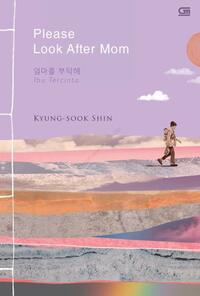You need to sign in or sign up before continuing.
Take a photo of a barcode or cover
emotional
mysterious
reflective
sad
slow-paced
Plot or Character Driven:
Character
Strong character development:
No
Loveable characters:
Complicated
Diverse cast of characters:
No
Wow. Easy to see why this book has been on the bestseller list in Korea.
emotional
sad
fast-paced
"how unfair is it that all she did was sacrifice everything for us, and she wasn't understood by anyone?"
i need to go call my mom
i need to go call my mom
NONE OF THEM DESERVED HER!!! TELL YOUR MOM YOU LOVE HER!!!!!!!! i cried five times
emotional
reflective
sad
medium-paced
Plot or Character Driven:
A mix
Strong character development:
Yes
Loveable characters:
Complicated
Diverse cast of characters:
Complicated
Flaws of characters a main focus:
Complicated
This book was a refreshing read, maybe because the author originally wrote it in Korean. There are passages that ramble, but overall I appreciated the way that the mother is revealed through the perspective of those who knew her best. A reflection on motherhood, gratitude, and family that is worth a read. Although, if you like a book packed with action and a firm resolution this is not for you.
challenging
emotional
reflective
sad
tense
medium-paced
Plot or Character Driven:
A mix
Strong character development:
Complicated
Flaws of characters a main focus:
Yes
One of the few books written in 2nd-person POV that are actually good, though some people might not like the sort of ambiguous ending.
I completely understand why this was a bestseller in South Korea when it was published.
This tells the story of 'Mom', of 69-year-old Park So-nyo, an elderly grandmother who goes missing after she gets separated from her husband in the crowd of Seoul subway station when they go to visit their children who live in the city.
This is what happens when 'Mom', when the person everyone takes for granted, goes missing. When everyone looks for her, but nobody can find her. When some people give up looking for Mom, because nobody can find her. When those who still care are left to deal with the search, futile as it may seem . . . and the only things left are the memories of Mom.
Mom's story is told from the perspectives of her eldest daughter, her eldest son, her husband (her selfish, entitled, useless, disloyal, unworthy husband), and, in the last part, Mom herself.
No matter the reader's first language, ethnicity, nationality, culture, there are universal themes that everyone can relate to, empathize with and understand. Motherhood, struggling to raise children, feed, clothe, look after and educate your children and your family, even your husband's family, the weight and labour of looking after everyone else around you while simultaneously being taken for granted by the same people you look after.
The tragedy of being a mother is that everyone sees you as a mother. That's it. Mom. Mother. Umma. Eomoni. Mum. Mummy. Mama. Don't worry, Mom knows. Mom will get it. Mom will do it. Mom will make it. Mom will make sure it's okay. Mom will make sure of everything. Mom will always be there. Often, a woman's entire identity is erased except for her motherhood. In countries where traditional gender roles are still enforced and perpetuated in the culture, this is especially true. Before I read this book I wasn't surprised that SK has the lowest birth rate in the world, and after reading it I am still not surprised at all.
I completely understand why this was a bestseller in South Korea when it was published.
This tells the story of 'Mom', of 69-year-old Park So-nyo, an elderly grandmother who goes missing after she gets separated from her husband in the crowd of Seoul subway station when they go to visit their children who live in the city.
This is what happens when 'Mom', when the person everyone takes for granted, goes missing. When everyone looks for her, but nobody can find her. When some people give up looking for Mom, because nobody can find her. When those who still care are left to deal with the search, futile as it may seem . . . and the only things left are the memories of Mom.
Mom's story is told from the perspectives of her eldest daughter, her eldest son, her husband (her selfish, entitled, useless, disloyal, unworthy husband), and, in the last part, Mom herself.
No matter the reader's first language, ethnicity, nationality, culture, there are universal themes that everyone can relate to, empathize with and understand. Motherhood, struggling to raise children, feed, clothe, look after and educate your children and your family, even your husband's family, the weight and labour of looking after everyone else around you while simultaneously being taken for granted by the same people you look after.
The tragedy of being a mother is that everyone sees you as a mother. That's it. Mom. Mother. Umma. Eomoni. Mum. Mummy. Mama. Don't worry, Mom knows. Mom will get it. Mom will do it. Mom will make it. Mom will make sure it's okay. Mom will make sure of everything. Mom will always be there. Often, a woman's entire identity is erased except for her motherhood. In countries where traditional gender roles are still enforced and perpetuated in the culture, this is especially true. Before I read this book I wasn't surprised that SK has the lowest birth rate in the world, and after reading it I am still not surprised at all.
Minor: Violence, Pregnancy, War
emotional
reflective
sad
tense
medium-paced
Plot or Character Driven:
Character
Strong character development:
No
Loveable characters:
No
Diverse cast of characters:
Yes
Flaws of characters a main focus:
Complicated
Cried like a baby. This book makes me reflect on my relationships with my parents and grandparents as they age.




